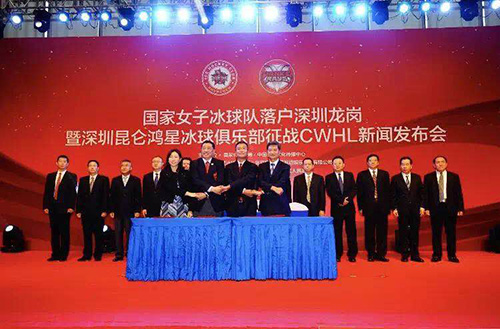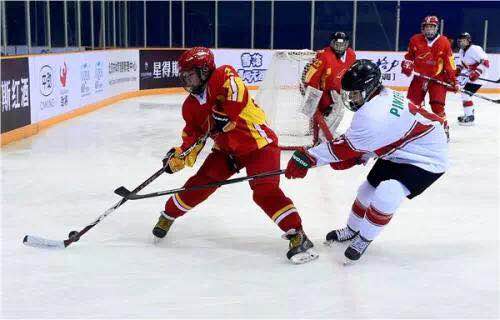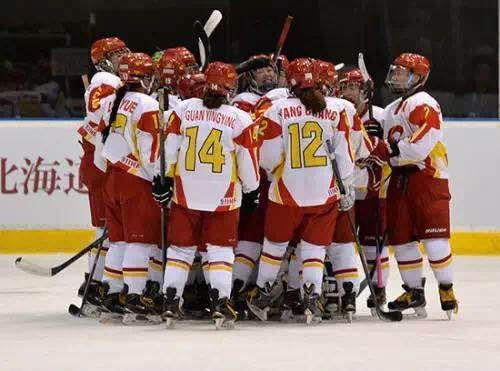


It has been 20 years since women’s hockey first became an Olympic sport. China finished fourth in the 1998 Nagano Olympic Games—the first time China showed its potential in hockey to the whole world.
20 years later, Baiwei Yu, the 29-year-old captain of the Chinese women’s national team was sitting in front of her television, watching the women’s hockey Olympic bronze medal game between Russia and Finland. She watched and cheered on Finnish goaltender Noora Räty, her teammate with the Kunlun Red Star. Finland defeated Russia by a final score of 3-2 to claim the third step on the podium. Baiwei was excited for her teammate, but at the same time frustrated.
The last Olympics Baiwei attended was the 2010 Vancouver Games. Since then, China has been fighting its way back to the Olympic stage. Failing to qualify for the 2014 Sochi Olympics was a blow to her confidence, but Baiwei still believed that they could return to the top stage once again. However, another collapse in 2016 qualification for Pyeongchang almost killed her dream.
“I didn’t want to cave, but the reality really hurt,” commented Baiwei on the national team’s most recent attempt at qualification. However, even after the heavy blow she still has faith as she has never been one to give up. “I love hockey, it is everything in my life and I love my country, I want to fight for it until I can’t play anymore.”

Team China’s Stumble and Fall
After hitting the peak in 1998, Team China started to struggle. The first instance of trouble came with a low number of female players in ice hockey. With more and more choosing to retire after the Nagano Games, China struggled to find enough talent to replace those leaving the program. It reached a point where they were drawing players from a pool of less than 200 female ice hockey players within the entire country.
In addition, Chinese players had no opportunity to compete regularly against other teams. There was no such thing as a collegiate athletic association or professional women’s hockey in China. They could only scrimmage with their own teammates or just keep practicing.
Finally, there is the issue of finance. Like many female athletes in most countries around the world, women’s hockey players have been left behind when compared to the support their male counterparts receive. Most players could not sustain their regular life by playing hockey resulting in many of them choosing retirement to have a full-time job.
Before qualification for the 2010 Vancouver Olympics, these struggles led both Team China and Baiwei to their first dissolution crisis.
“We were in very difficult shape in 2008,” said the national team captain. During one team building activity alongside her current CWHL teammates with the Kunlun Red Star, Baiwei shared her story, “We were told if we couldn’t qualify for the 2010 Olympics, they would cut the women’s national hockey team entirely.”
It was the hardest time for Baiwei Yu.
“I could not let this happen, that was all I thought in 2008,” stated Baiwei. “I had no plan B, hockey is all I have in my life.”

Baiwei and her teammates practiced day and night under huge pressure before qualification with limited financial support, but they never gave up. The second-round of qualification was held in Shanghai, China in November 2008. With a shared goal, the Chinese women strived to win and in doing so achieved the necessary goal of qualification, staving off dissolution.
However, after 2010, Team China once again hit rock bottom. Relegated to Division 1B during the 2011 World Championship, China has never found a way back to the top division. In 2013, the team changed over 95 percent of its players with a young group joining a select few veterans.
“The team in 2013 was all young and inexperienced and I was chosen to be the captain and to lead the group,” recollected Baiwei. “You can’t even imagine the pressure and frustration during that time. I was only 24 years old but already the oldest player on the team. I was not necessarily a big sister to them, but more like a parent, taking care of all these young women. But I understood our situation, cultivating young players was the best way to grow hockey.”
Kunlun Red Star turn over a new leaf for Team China
Not enough players, not enough game experience, and not enough financial support. With the introduction of the Kunlun Red Star and Vanke Rays to the CWHL, China made a move to address these three struggles and established their first women’s professional teams.
“I have waited for years and now finally we have a chance to play real professional hockey with the top players in the world,” said Baiwei. “We can apply the knowledge from our competitive experience and from our amazing teammates and coaches to help create a strong Team China.”
On November 19, 2017, Baiwei Yu scored in the first period of a game between Kunlun and the Toronto Furies. That goal marked the first ever scored by a Chinese-born player in CWHL. It has not been the last.
Hurdles remain for Baiwei and the Chinese women: language barriers, cultural barriers, and even adapting to an entirely new hockey mindset. Baiwei, as the only Chinese player who has played professional hockey overseas before, is pivotal in helping the young athletes get through this transition.

2022 Beijing Olympic
The Chinese national team veteran turns 30 this July and will be 34 years old come the 2022 Beijing Olympic Games. However, she remains the spirit of the team and the driving force of a strong Team China.
“Team China is getting better and better every day after playing in the CWHL. We will do our best to fight, to battle, and we are making every minute spent in practice or training count. I have never stopped dreaming and we will never stop fighting.”
As the 2018 Pyeongchang Olympic Games takes its curtain call, the four-year countdown to the 2022 Beijing Olympics begins. A reborn Team China is looking forward to competing in front of their people.
 Fire brigade in Shanghai holds group wedding
Fire brigade in Shanghai holds group wedding Tourists enjoy ice sculptures in Datan Town, north China
Tourists enjoy ice sculptures in Datan Town, north China Sunset scenery of Dayan Pagoda in Xi'an
Sunset scenery of Dayan Pagoda in Xi'an Tourists have fun at scenic spot in Nanlong Town, NW China
Tourists have fun at scenic spot in Nanlong Town, NW China Harbin attracts tourists by making best use of ice in winter
Harbin attracts tourists by making best use of ice in winter In pics: FIS Alpine Ski Women's World Cup Slalom
In pics: FIS Alpine Ski Women's World Cup Slalom Black-necked cranes rest at reservoir in Lhunzhub County, Lhasa
Black-necked cranes rest at reservoir in Lhunzhub County, Lhasa China's FAST telescope will be available to foreign scientists in April
China's FAST telescope will be available to foreign scientists in April "She power" plays indispensable role in poverty alleviation
"She power" plays indispensable role in poverty alleviation Top 10 world news events of People's Daily in 2020
Top 10 world news events of People's Daily in 2020 Top 10 China news events of People's Daily in 2020
Top 10 China news events of People's Daily in 2020 Top 10 media buzzwords of 2020
Top 10 media buzzwords of 2020 Year-ender:10 major tourism stories of 2020
Year-ender:10 major tourism stories of 2020 No interference in Venezuelan issues
No interference in Venezuelan issues
 Biz prepares for trade spat
Biz prepares for trade spat
 Broadcasting Continent
Broadcasting Continent Australia wins Chinese CEOs as US loses
Australia wins Chinese CEOs as US loses